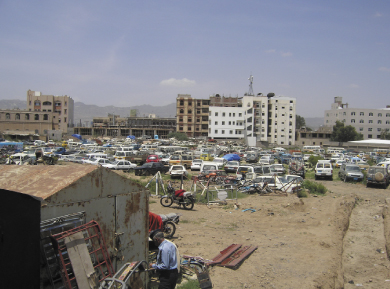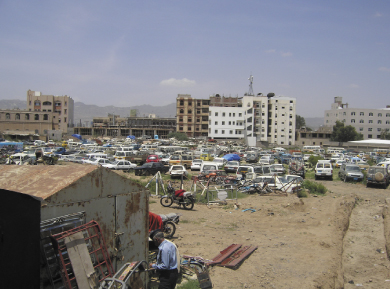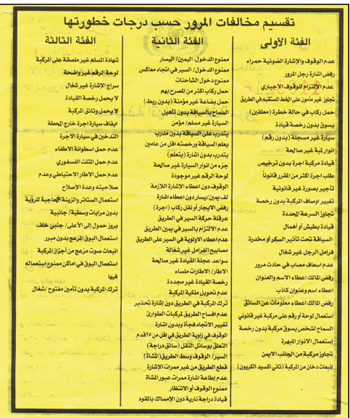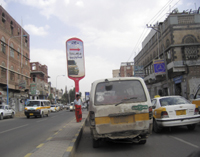
Number of vehicles doubles in less than two years [Archives:2007/1081/Reportage]
August 30 2007
 |
 |
 |
Road unworthy cars, pollution, law-breaking drivers – and a shortage of staff -these are some of the problems traffic wardens suffer from in Yemen. It has become a difficult job; more and more wardens are quitting or asking to be transferred to other jobs. However, Colonel Yahya Shubail director of the Traffic Administration for the Capital sees hope in a new plan that is supposed to save the situation.
“The transition phase is going to be very difficult and very long. However, on the long term, results will be worth the trouble. It is like a going through a surgery in order to be cured,” he commented on the 16-year traffic project proposed by his administration to the government and which is still looking for funding.
The current situation in Sana'a is dreadful, traffic authorities acknowledge this, and are asking for help. One of the main stakeholders concerned is the Ministry of Public Works, which is responsible for roads, construction, infrastructure and even traffic lights and road sign. According to the traffic administration, the number of licensed plate numbers issued for vehicles in Sana'a ranged from 35 to 40 thousand between 1990 and 2005. Since 2005 and until the end of 2006, this number has more than doubled exceeding 85 thousand. “But the roads are the same and the traffic workforce is the same, so what do you expect us to do?” asks Shubail.
Since 2005 the shift length for traffic wardens has increased from 4 hours to 6 hours. Some traffic men take more than one shift working 10 hours or more per day, exposing themselves to sun and rain, and worse lead coming from the air polluting vehicles.
The average salary of a traffic warden does not exceed 20,000 Yemeni Riyals (almost 100 US dollars).
Two years ago, former Prime Minister Abdulqadir Ba Jammal decreed that traffic men get a commission equaling 30 percent of the fines of each traffic violation they issue. Consequently, the revenue from fines in Sana's jumped from hundreds of thousands to four million Yemeni Riyals per month. However, with a total workforce of 1500 traffic men this commission yields an average of 1000 Yemeni Riyals per month. Which is not exactly a big enough bonus to motivate traffic men to issue tickets.
“You could ask, why then not issue more tickets? To be honest, if we issue a ticket for every offence all the vehicles in the streets will get tickets. We take it easy on people especially when we know that life is hard,” said Suhaib Abdullah a traffic warden who has been serving over 4 years.
Some traffic men admitted to taking bribes or letting violating vehicles go for a small amount of money.
A traffic warden admits to this: “personally I don't give a ticket for every offence. Sometimes when a bus driver violates the traffic law, he can't afford to pay 1500 Riyals for the ticket, so we sympathize with him and take two or three hundred and let him go. We do this only for minor offences.”
It adds up better that way because the commission is not worth the trouble, especially if the traffic man runs into a strong-headed driver who refuses to acknowledge the traffic warden's authority.
According to traffic officer Ahmed Ali Hassan, they normally don't issue tickets for government vehicles or VIPs, “because they don't pay them”.
“VIP and police car drivers are the worst and most reckless drivers by far and are the culprits behind many accidents. I do not issue them a ticket because I fear being abused and I know they won't pay them,” said traffic man Abdu Ismail.
However, since the beginning of this year in tickets issued for army or police cars get sent directly to their accounts departments at the Ministry of the Defense and Interior and the money is deducted from salaries. Colonel Shubail believes this has reduced the offences caused by government and army cars significantly.
Street vendors especially during social and cultural celebrations also make traffic congestion worse. The municipality must play a role here through dedicating open markets away from the streets.
Demonstrations add another burden. Activists and protestors cause traffic jams through marching in the streets in large numbers, especially is not without a prior notice.
The biggest enemy
Army officers and VIPs who think they are above the law seem to find out – at least concerning traffic – which they are not. However, there is no doubt that buses and taxis cause the biggest headaches.
All the traffic men Yemen Times interviewed agreed that buses and taxi drivers cause most offences. There isn't a fixed number for how many fines are issued daily in Sana'a. The average is between 20-30 tickets per day mostly for parking in undesignated areas, driving in the wrong direction, or crossing a red light.
Road unworthiness is not considered ticket-worthy by the wardens although it is stipulated in the list of traffic violations. The traffic administration authority with support from Ministry of Interior had succeeded last year in issuing a law to ban import of any vehicle manufactured before year 2000.
This helped enhance the quality of cars in the streets as any new cars since 2006 will have to be of good condition. However, loads of cars still wonder Sana'a streets in miserable conditions, causing accidents but more importantly belching black exhaust fumes that pollute the environment and cause health problems for all of us.
“If only the traffic man knew what is getting into his body because of the pollution from cars! Lead poisoning is very likely and many traffic wardens land up with lung diseases after a few years of working in the streets,” complained colonel Shubail. There is no health insurance or risk management for the traffic men, and there is no provision for any improvement in this matter. “What budget?” fired back a gloomy Shubail when asked about the budget allocated for the traffic authority? The administration operates on its own revenues, which hardly covers the wages of the staff.
“We are suffering from problems that had been accumulated over the years and have become chronic. There was no vision when planning this city, all we can do now is trouble shooting,” he said. He hangs all his hopes on the proposed plan that is still on paper because of lack of funding. His administration had proposed to the government adopting the example of Jordan where broken busses and taxis were taken away and their owners compensated with new vehicles. However, this proposal seems difficult to implement considering the deterioration of national economy.
He insisted that total blame should not fall on the traffic authority alone. Because there are other concerned authorities such as the Ministry of Public Works should “do their job and take responsibility for the damaged roads and traffic mess”.
——
[archive-e:1081-v:15-y:2007-d:2007-08-30-p:report]


